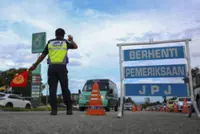
FILE PHOTO: Armed Forces of the Democratic Republic of Congo (FARDC) soldiers take their positions following renewed fighting near the Congolese border with Rwanda, outside Goma in the North Kivu province of the Democratic Republic of Congo, May 28, 2022. REUTERS/Djaffar Sabiti/File Photo
Paris (Reuters) - Soldiers from Democratic Republic of Congo's 223rd Battalion were sent to the lush hillsides near Lake Kivu to repel a rebel advance threatening Goma, the largest city in the mineral-rich east and home to 2 million people.
But as the M23 movement closed in last December, the army unit's commander faked a medical note to justify returning to Goma and, in his absence, his troops abandoned their positions without a fight, according to military prosecutors at his court martial.
Uh-oh! Daily quota reached.


































